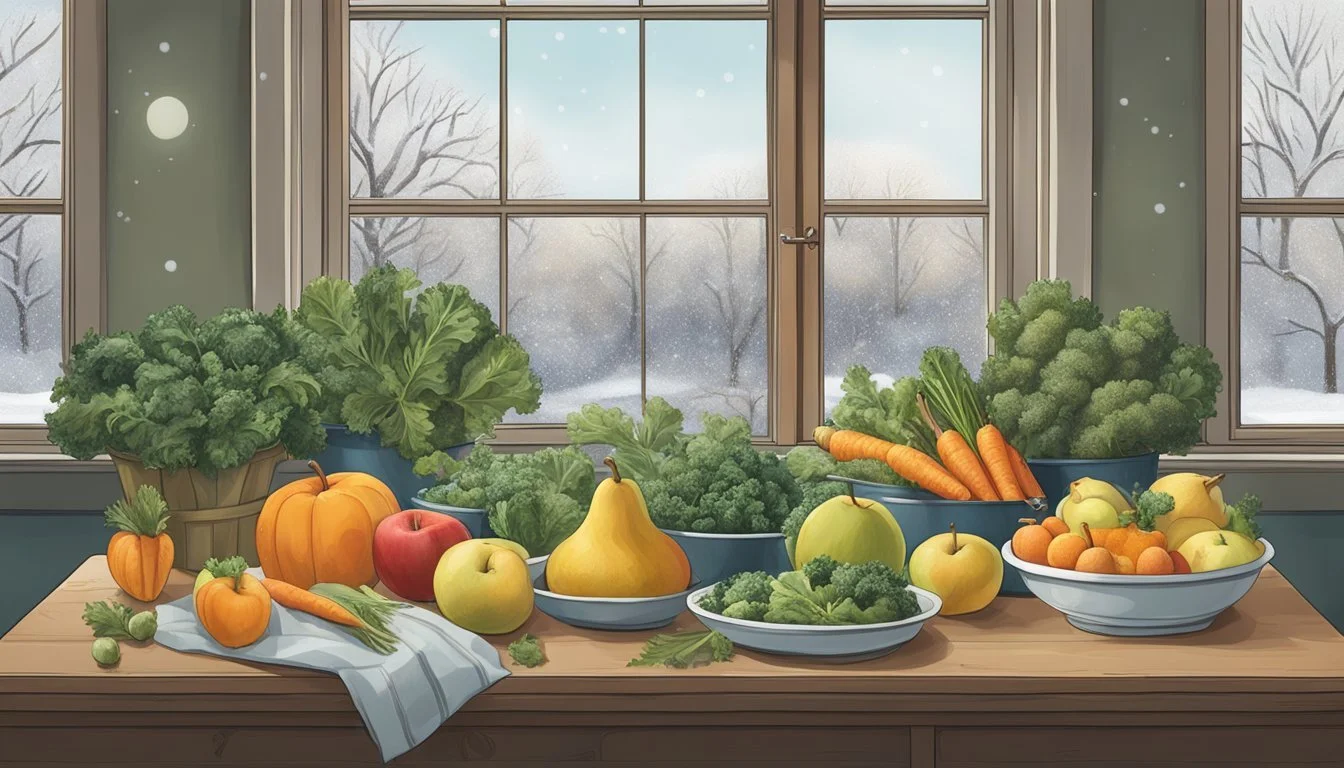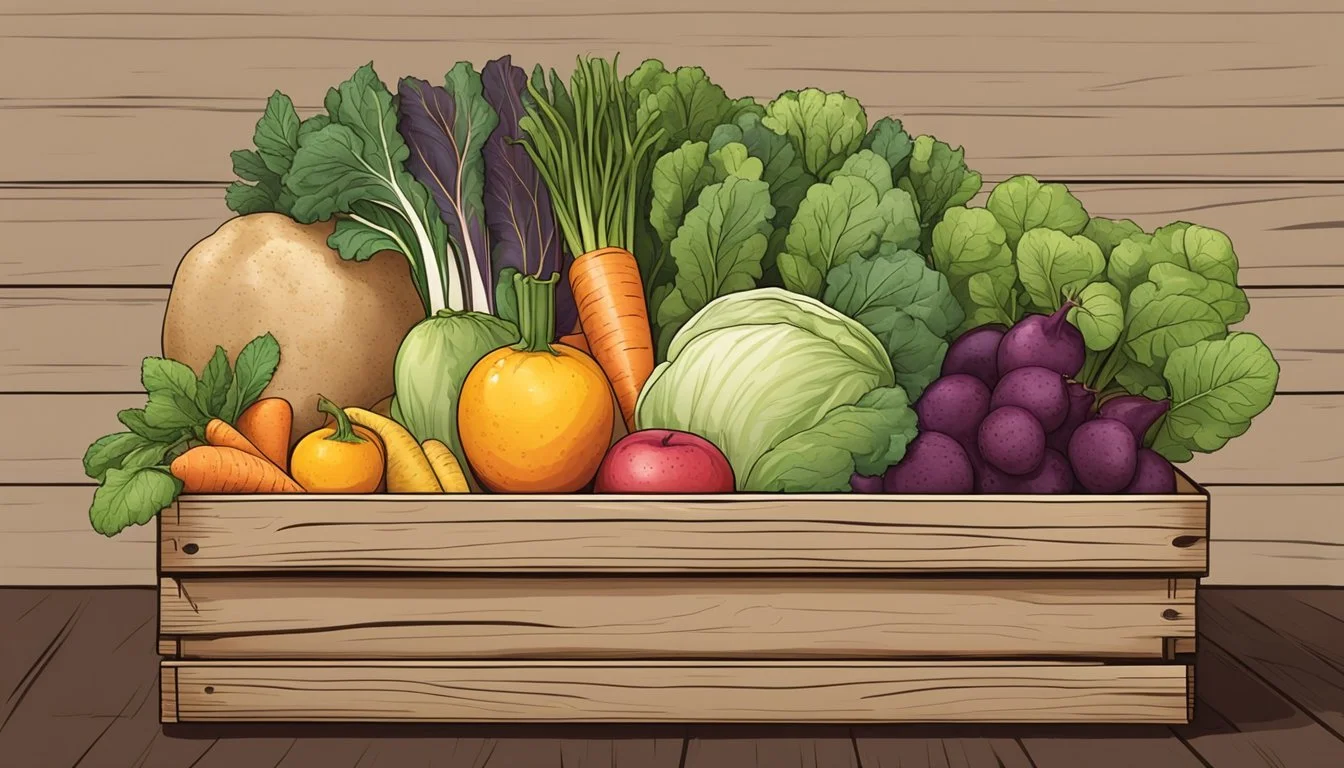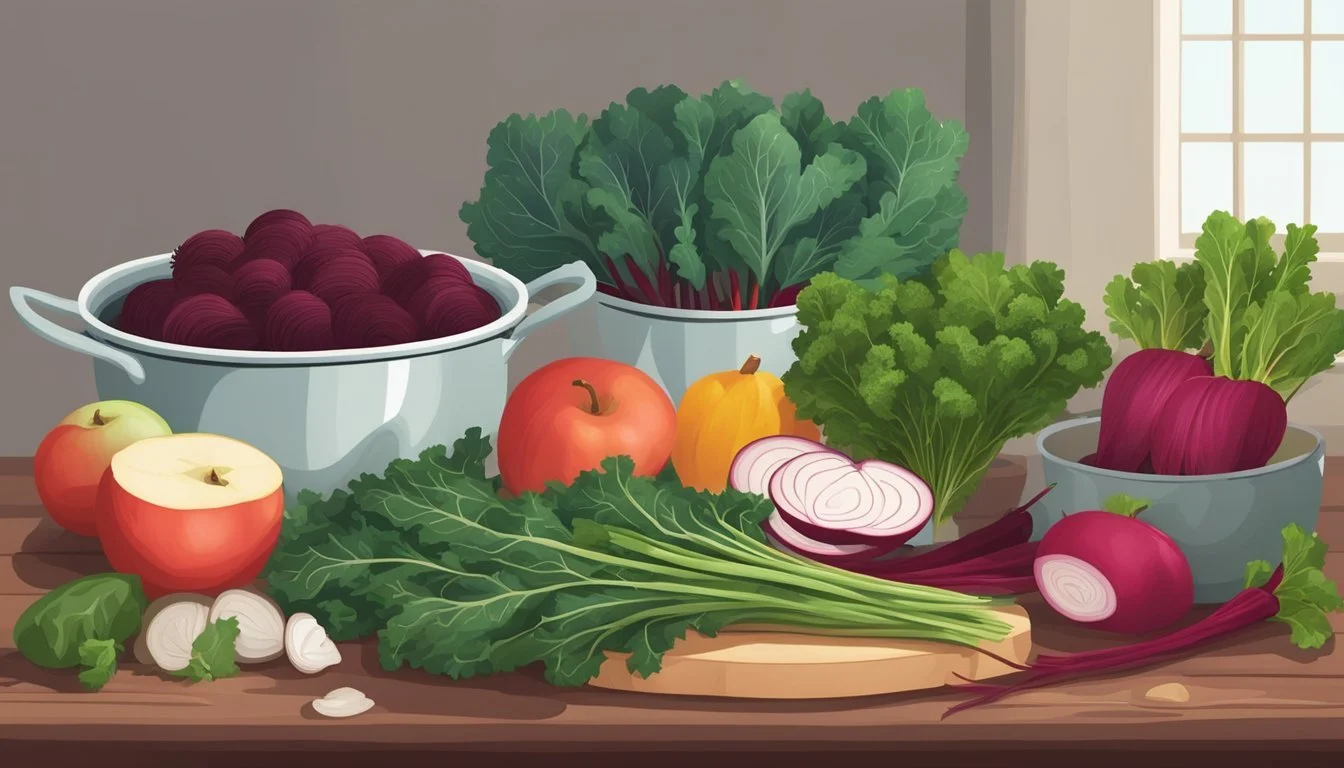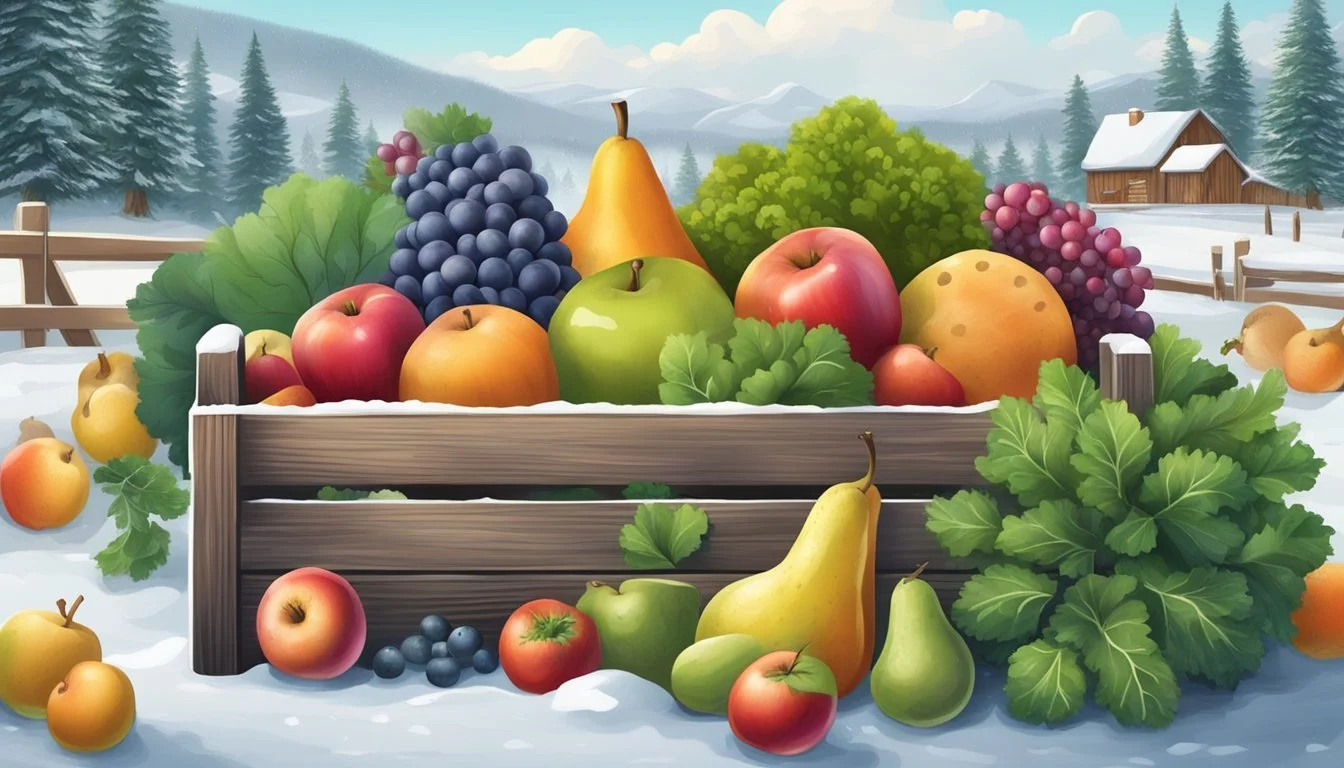New Jersey Seasonal Fruit & Vegetables in January
A Guide to Winter Produce
This Article is Part of our New Jersey Seasonal Fruit & Veg Calendar
The garden state, New Jersey, offers a rich tapestry of agricultural produce throughout the year. January, with its winter chill, may not seem like the prime time for fresh fruits and vegetables, but the state's farms still provide an array of seasonal produce. Root vegetables and hardy greens are staples during this time, persevering through the frost to bring freshness to the dinner table.
In the colder month of January, New Jersey's farmers markets and grocery stores are stocked with locally grown, seasonal items that are at their peak in flavor and nutrition. Although the variety is more limited compared to the summer months, consumers can still enjoy winter squash, sweet potatoes, and a selection of leafy greens. These crops have adapted to thrive in cooler temperatures, ensuring that even in the depths of winter, residents have access to fresh, local produce.
Understanding the seasonal cycles of fruits and vegetables is key for consumers aiming to eat fresh and support local agriculture. In New Jersey, January presents an opportunity to enjoy produce that not only withstands the winter but also offers comfort and nourishment during the shorter days and longer nights. It's a time to celebrate root vegetables and hardy greens, which are not just surviving but flourishing during the season.
Understanding Seasonality
In New Jersey, January's seasonality affects the availability of produce, influencing the culinary landscape. During this time, the calendar dictates a limited variety of fruits and vegetables that can withstand the cold climate.
Winter Produce Overview
In the midst of winter, New Jersey offers a specific subset of produce that can endure the chilly temperatures. Hardy vegetables and stored crops from previous months are readily available. Consumers can expect to find the following in their local markets:
Root Vegetables: Including items such as carrots, turnips, and beetroots, which are known for their long shelf life.
Leafy Greens: Kale (What wine goes well with kale?) and collards thrive in cooler weather, providing fresh greens even in the colder months.
Stored Produce: Items like apples and pears stored from the fall harvest continue to be available.
Reasons for Seasonality
Two main factors contribute to the seasonality of produce: the region's climate and the natural growing cycle of plants. New Jersey's winters are cold, limiting the types of fruits and vegetables that can be grown outdoors during this period. As a result, the selection mostly includes produce that either grows in cold weather or stores well after the fall harvest. The seasonality is also connected to the natural ripening process, whereby certain crops reach maturity at different times of the year.
Monthly Harvest Calendar
January is the heart of winter in New Jersey, and while the landscape may seem dormant, certain crops are harvested during this season. Consumers can find locally grown, seasonal produce which is fresher and has a lower environmental impact due to reduced transportation.
Fruits in Season
In New Jersey, January is not the peak time for fruit harvests, as most fruits are out of season. However, one might find stored apples still available from the fall harvest.
Vegetables in Season
January's cold embraces New Jersey's fields, yet some hardy vegetables remain in season, often sweetened by the frost. The typical vegetables one can find are:
Storage Vegetables:
Beets
Carrots
Potatoes
Winter squash
Leafy Greens:
Kale
Collards
Others:
Turnips
Leeks
These vegetables are generally stored from previous months' harvests or grown in controlled environments such as greenhouses.
Fruit Highlights
In New Jersey, January is a time where the selection of local fruits is limited due to the cold climate. However, certain apple varieties remain available and citrus fruits are at their peak, imported from warmer regions to grace the winter tables.
Apple Varieties
During January, one can still enjoy a range of apple varieties in New Jersey. While the types available may vary based on the previous year's harvest and storage capabilities, these typically include:
Storage Apples: Apples such as 'Fuji', 'Granny Smith', and 'Red Delicious' are often kept in controlled environments to maintain freshness throughout the winter months.
Late Harvest Apples: Certain apple types like 'Pink Lady' and 'Braeburn' have later harvest seasons, extending their fresh availability into the winter.
Citrus Fruits
Citrus fruits are not grown in New Jersey during January, but they are widely available from other regions. These fruits are celebrated for their vibrant flavors and are a valuable source of Vitamin C during the colder months:
Oranges: Varieties like 'Navel' and 'Cara Cara' are juicy and sweet, perfect for eating fresh or using in recipes.
Grapefruits: With a bolder taste, grapefruits like the 'Ruby Red' have a balance of sweetness and tang.
Lemons and Limes: Essential for their zest and juice, they add brightness to a variety of dishes, dressings, and beverages.
Vegetable Highlights
In January, New Jersey offers a rich variety of vegetables that thrive in colder weather, from sturdy root vegetables to nutrient-dense leafy greens and hearty winter squashes.
Root Vegetables
New Jersey's January gardens bring forth an abundance of root vegetables. These underground treasures are prized for their storage capacity and robust flavors.
Beets: Deeply colored and earthy, they are ideal for roasting or boiling.
Turnips: A versatile vegetable, turnips can be mashed, roasted, or added to stews.
Carrots: Known for their sweetness, especially when roasted to enhance their natural sugars.
Leafy Greens
The state's winter climate is conducive to the growth of several leafy greens, which are packed with vitamins and minerals.
Kale: This hearty green is perfect for salads, soups, and chips.
Collards: With a slightly bitter taste, they are often slow-cooked to tender perfection.
Cabbage: It offers a crunchy texture, ideal for slaws or fermented dishes like sauerkraut (how long does sauerkraut last?).
Winter Squashes
Winter squashes offer comforting flavors and versatility in January's meal planning.
Butternut Squash: (how long does butternut squash last?) With a smooth texture, it's excellent pureed for soups or cubed and roasted.
Acorn Squash: Its distinctive ridges and sweet flesh make it ideal for baking and stuffing.
Local Farming and Gardens
January in New Jersey is a month of planning and preparation for local farms and community gardens. While the fields may lay dormant, both types of establishments strategize for the upcoming growing season, ensuring a rich harvest of fresh produce later in the year.
New Jersey Farms
New Jersey farms are renowned for their high-quality produce. In January, farmers are primarily engaged in maintenance and preparation activities. They analyze the past season's yield and strategize crop rotations to maintain soil health. Even with the cold weather, some farms may offer cold-hardy crops through winter farming techniques or indoor hydroponic systems.
Common Activities in January:
Soil testing and fertilization planning
Equipment maintenance and repairs
Ordering seeds for the spring planting
Implementing and managing greenhouses or indoor growing systems for year-round production
Community Gardens
Community gardens in New Jersey serve as hubs for local engagement and education about sustainable agriculture. During January, these gardens often host planning meetings for plot assignments and educational workshops for new gardeners.
Services Provided by Community Gardens:
Collaborative planning for spring and summer plots
Educational resources for organic gardening and composting
Networking events for gardeners to share tips and resources
With the cold weather setting in, community gardeners typically use this month to ensure that their tools and resources are ready for the upcoming planting season. Community gardens rely on the efforts of volunteers and local residents to create spaces that not only produce fresh vegetables and fruits but also promote community bonding and environmental stewardship.
Where to Buy Seasonal Produce
In January, residents of New Jersey have distinct venues to purchase fresh, seasonal produce. These primarily include farmers markets and grocery stores across the state.
Farmers Markets
Farmers markets serve as a prime source for fresh fruits and vegetables. They are typically stocked with produce grown in the state, ensuring customers have access to items that are both fresh and seasonal. New Jersey hosts a variety of farmers markets, some of which operate year-round or offer indoor options during the colder months. Patrons can find locations by visiting the Jersey Fresh website or checking local community boards.
Examples of Seasonal Produce at Farmers Markets:
Apples
Squash
Leafy Greens like spinach and kale
Grocery Stores
Grocery stores in New Jersey also offer a selection of seasonal produce, sourced from both local farmers and other regions. They strive to provide fresh produce during winter, with some stores featuring a "Jersey Fresh" section dedicated to locally grown items. Availability can vary based on store and location, but many stores aim to highlight seasonal produce.
What to Look for in Grocery Stores:
Local Signs: Indicators that the produce is sourced from New Jersey farms.
Seasonal Displays: Sections that showcase seasonal fruits and vegetables.
By frequenting farmers markets and being discerning at grocery stores, consumers can support the state's agriculture and enjoy the freshest produce available.
Seasonal Cooking and Recipes
Cooking with seasonal produce in January in New Jersey brings out the best flavors of the winter harvest, providing freshness and variety to recipes.
Winter Recipes
In New Jersey, January's harvest inspires a range of winter recipes. Utilizing seasonal vegetables like winter squash, including acorn and butternut, chefs and home cooks can create hearty soups and stews that are both nourishing and warming. For instance, butternut squash soup becomes a staple, often enhanced with spices such as cinnamon and nutmeg to complement the squash's natural sweetness.
Fruit recipes focus on citrus, with items like grapefruit, oranges, and tangerines adding bright flavors to both sweet and savory dishes. A simple, rustic orange and beet salad with a sprinkle of feta cheese captures the seasonal spirit with its vibrant colors and fresh taste.
Here is a concise list of January ingredients and corresponding recipe ideas:
Winter Squash: Squash soups, roasted side dishes
Citrus Fruits: Citrus salads, marmalades
Leafy Greens: Kale and spinach salads, sautéed greens
Root Vegetables: Roasted beet and carrot medleys
Brussels Sprouts (how long do brussels sprouts last?): Caramelized Brussels sprouts
Cooking Techniques
Cooking techniques in January favor methods that bring warmth and comfort. Braising and roasting are highly popular, maximizing the natural sugars in root vegetables and transforming Brussels sprouts with a deliciously crispy texture. These methods not only impart a rich flavor but also preserve the nutritional content of the produce.
Slow cooking is another technique suited for January's produce. It allows the robust flavors of seasonal vegetables to meld together, as seen in stews and casseroles. Meanwhile, grilling citrus can intensify their flavor, adding a caramelized note that enhances both the aroma and the taste of the fruit.
When cooking with January's produce, the emphasis is on methods that highlight the ingredients' freshness and depth of flavor. Below is a list of techniques paired with produce that benefit from them:
Braising: Ideal for tougher greens like kale
Roasting: Perfect for root vegetables and winter squash
Slow Cooking: Suited for stews and soups
Grilling: Excellent for citrus fruits to bring out a smoky sweetness
Preserving the Harvest
In New Jersey's cooler January climate, preserving the yield of hardier fruits and vegetables becomes pivotal. Techniques like canning and freezing not only extend the shelf life of these products but also lock in nutritional value and flavor.
Canning Fruits and Vegetables
Canning is a method that involves placing fruits and vegetables in airtight containers to prolong shelf life. To ensure safety and quality, one must follow specific steps:
Preparation: Wash and sort the produce, removing any damaged or diseased parts.
Packing: Fill the jars, leaving the headspace as recommended for the specific fruit or vegetable.
Processing: Use a boiling water canner or pressure canner, based on the type of produce being canned.
Sealing: After processing, jars should be sealed properly and left to cool. A proper seal is crucial to prevent spoilage.
Freezing Tips
Freezing is another practical approach to preserving the harvest. Here are some key points for freezing produce:
Blanching: Vegetables should generally be blanched before freezing to halt enzyme activity that can spoil the flavor and color.
Packing: Fruits and vegetables should be packed in air-tight, moisture-resistant containers or bags.
Labeling: It's important to label each package with the content and the date of freezing.
Storage Temperature: Keep the freezer at 0°F (-18°C) or lower to properly preserve the produce.
These methods allow New Jersey residents to enjoy local produce like turnips, radishes, and carrots well beyond their typical season.
Health Benefits of Seasonal Eating
Eating seasonally offers a host of health benefits, including heightened nutritional content and support for local agriculture. This section explores the specific advantages of incorporating seasonal produce into the diet.
Nutritional Advantages
Seasonal fruits and vegetables tend to be fresher and are often harvested at their peak ripeness, which means they can be more nutrient-dense than off-season counterparts. For instance:
Vitamin C: Citrus fruits, prevalent in winter months, are high in Vitamin C and can support immune function.
Antioxidants: Seasonal berries and leafy greens are packed with antioxidants that may help reduce the risk of chronic diseases.
Eating a variety of seasonal produce ensures a wide range of nutrients in one's diet, contributing to overall health.
Supporting Local Economy
Choosing to purchase seasonal produce can also have a positive impact on the local economy.
Local Farmers: Buying from New Jersey markets supports local farmers who rely on the sale of their produce.
Community Health: Money spent locally stays within the community, fostering economic growth and, in turn, can promote better community health resources.









